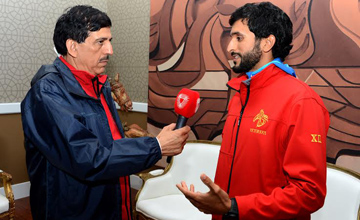Following the 2011 pro-democracy protests, Bahraini authorities suspended approximately 120 athletes and sports club personnel, including twenty-seven members of national sports teams. As journalist Karim Zidan recently documented, while the Bahraini government subjected many of these athletes to torture and other forms of reprisal, it has simultaneously used sports to divert attention from such ongoing human rights violations.
Bahraini police arrested twenty-two athletes between April and June 2011. Sheikh Nasser bin Hamad al-Khalifa – son of King Hamad, Commander of the Royal Guard, Chairman of the Supreme Council for Youth and Sport, and President of the Bahrain Olympic Committee – led the clamp-down on athletes during the protests. Sheikh Nasser publicly called on a “judgment day” for all athletes that exercised their rights to protest. Ala’a Hubail and Sayed Mohammad Adnan, both Bahrain national football team players, called into a television broadcast to defend their involvement in peaceful protests. The next day, the Bahraini government arrested them both. Security officials tortured Hubail, and after his release, he fled to Oman.
In 2011, one Bahraini man claimed Sheikh Nasser personally tortured him. After the man fled to England to seek refuge, he called for Sheikh Nasser’s arrest. Despite the torture allegations, Sheikh Nasser was able to attend the London Olympics the following year. It was not until 2014 that a UK High Court declared Sheikh Nasser unprotected from prosecution.
More recently, in 2016, Sheikh Nasser made headlines when he announced a new Bahrain cycling team with a budget upwards of £13 million. A year earlier, in 2015, Sheikh Nasser handpicked thirteen athletes to form a group of racers called the “Bahrain 13 Endurance Team.” The name of the team appears to be an attempt to obscure another “Bahrain 13” – a prominent group of activists and human rights defenders arrested during the 2011 pro-democratic protests.
Americans for Democracy & Human Rights in Bahrain (ADHRB) has submitted several legal complaints concerning Bahrain’s continued abuse of athletes. In 2014, ADHRB submitted a complaint to the Organization for Economic Cooperation and Development (OECD) regarding Formula One’s direct impacts on human rights in Bahrain in relation to its annual race in the country. As a result of that complaint, Formula One decided to adopt a human rights policy the following year to examine the race’s effect in Bahrain. In 2015, ADHRB and the Bahrain Institute for Rights and Democracy (BIRD) submitted evidence of Sheikh Salman’s human rights abuses to FIFA, recommending he be disqualified as candidate for president of the organization. FIFA reportedly carried out ‘integrity checks,’ which should have investigated all of the candidate’s involvement in human rights abuses. On 10 February 2016, ADHRB filed an OECD complaint on Sheikh Salman’s FIFA presidency. Following the submission and media coverage of the complaint, Sheikh Salman failed to obtain the presidency.
Human Rights Watch finds that political activists, including athletes, still face systematic restrictions on freedom of speech. Athletes are manipulated as political tools and face restrictions just as political activists do. Because they tend to be more well-known than human rights activists, athletes face greater scrutiny to outwardly conform to a government-sanctioned political ideology. Sports in Bahrain are continually used to divert from the country’s ongoing human rights violations and to maintain a false image of esteem in the country.
Bobby Froembling is an Advocacy Intern at ADHRB.





